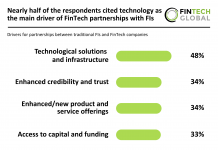Over half of financial decision makers at retail banks believe that PSD2-led Open Banking regulation has had a ‘negative’ impact on their organisation.
In the new study conducted by Pepper, the mobile banking division of Israeli bank, Bank Leumi, found 58 per cent of respondents believed Open Banking had a negative impact and 48 per cent said the new regulations put too much red tape.
The responses were collected from C-suite and director level decision-makers at retail banks in regard to their thoughts on the ‘Open Banking regulations, potential competition from tech giants, and the performance of fintech companies.’
Around a third of respondents claimed Open Banking had not only caused confusion amongst their customers but also employees. Of those to participate in the study, 64 per cent claimed the new regulations have already given large technology companies a ‘distinct advantage’ over traditional banks.
Two-thirds of participants believe tech giants like Google and Amazon will be offering retail banking services in the UK within five years.
However, while there has been a negative response, 56 per cent of the respondents believe Open Banking is an opportunity for traditional banks to change and become more customer-centric.
There is a wide belief among those questioned that the financial services space was changing, with 34 per cent expecting traditional banks will cease to exist in the same way they currently do by 2023. Instead, banking services will be split into specific locations, such as dedicated payment solutions or lending platforms.
The majority of respondents saw banks failing to keep up with developments, with 82 per cent indicating the banks are not innovating fast enough to meet changing customer needs. Following on from this, 48 per cent taking part in the study agreed that banks are three years behind FinTechs.
Reasons for failing behind were a reluctance to adapt to new technology (65 per cent), a culture not focused on innovating (57 per cent), and because legacy systems make it longer to evolve (53 per cent).
With banks so far behind their counterparts, 54 per cent of those questioned believed collaboration was essential with FinTechs.
Pepper CEO Michal Kissos Hertzog said, “Clearly financial decision-makers feel that Open Banking has opened the door to tech giants to jump into the retail banking space, but this must not be feared. Open Banking can create a real revolution that benefits traditional banks, not only the huge tech companies. In my view, it won’t end in a ‘winner takes all’ scenario, like in other industries.
“The two main challenges for banks today are utilizing the huge amount of data they have gained for the benefit of customers; and collaborating with FinTechs and third parties – which are made possible in light of Open Banking – in order to offer the best value proposition.
“Having said that, another big challenge for traditional banks today is changing their outdated legacy IT systems, some of which were built decades go. Despite this very challenging situation, it actually – in a positive way – forces banks to put innovation at the heart of what they do from now on and will help them to put up a fight with the tech giants.”
Copyright © 2019 FinTech Global











